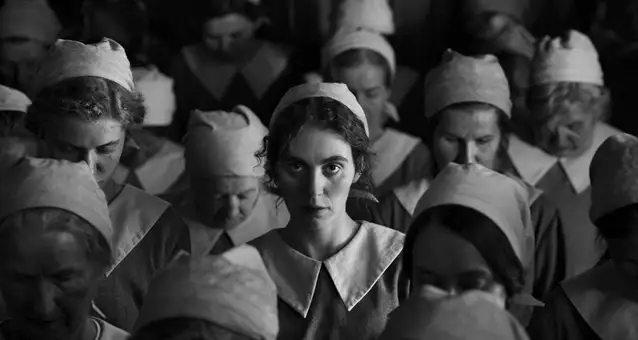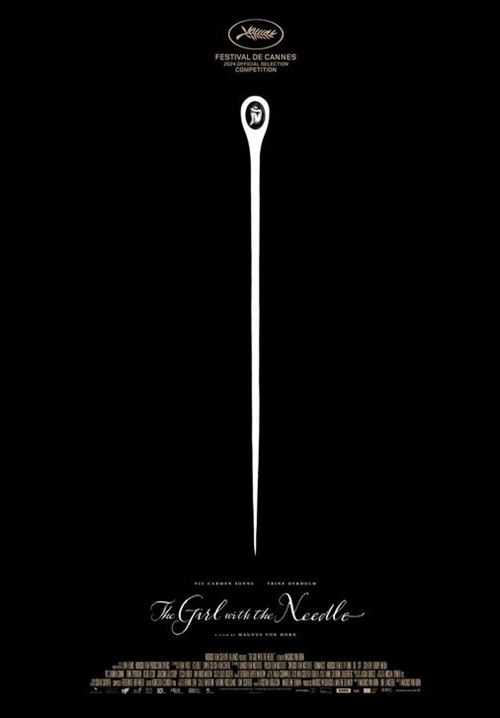Cannes 2024 – “The young woman with the needle” by Magnus von Horn: a dark and disturbing plea for women’s rights
After The next day (The here after), presented in preview at the fortnight of filmmakers in 2015, then Sweatshirtin official selection at the Cannes Film Festival in 2020, the Swedish director Magnus von Horn returns to Cannes with Pigen Med Nålen (the young woman with a needle)a new feature film, this time in the Danish language.
In the running for the Palme d’Or, the Swedish experiences a new artistic approach with an period film. Inspired by a true story, that of the most controversial murder in the history of Denmark and a real national trauma, the film tells the story of Karoline, a young worker fighting to survive in the Copenhagen of 1918. When the latter falls pregnant, she meets Dagmar, a woman who directs a clandestine adoption agency. Karoline first agrees to give him his baby to have him adopted and then a nanny role at his side.
Karoline’s life is marked by misery and distress. Seamstress in a textile factory converted into the manufacture of uniforms, she fights daily to reach both ends. The war raged in Europe and Karoline, without news of her presumed husband who died in combat, finds himself in a desperate situation. Expected by its owner, she is forced to live in a sordid, dirty and without running water. And in addition, to add to her misfortunes, she gets pregnant after being abused by her boss, who had promised her marriage but who had abandoned her later. The film plunges the spectator into a Copenhagen of 1918 dark and devoid of hope, where misery is omnipresent.
The film is shot in black and white, accentuating the darkness of grime, morbid events and human distress. Von Horn pushes spectators to face this dark reality, some could see voyeurism there, but the approach seems to be a desire to confront the audience with a brutally realistic era.
One aspect of the film personally challenged me. The film takes place in a Nordic country, at the end of the First World War, a period marked by extremely difficult living conditions for the working classes. These people work without any social advantage, in the most total precariousness, carrying out hard work and living in misery and filth. The streets are muddy, running water does not yet exist and hygiene is almost nonexistent. Today, these Nordic countries are examples of development, but the film shows us a very different reality at the beginning of the 20th century.
For me, the question that arises: how have these Nordic countries have developed at this point in just a century? When did this switch to progress towards progress? And why in a large part of the Arab countries, this changeover did not take place? It seems to me that the creation of social assistance institutions, the vote of progressive laws, such as contraception and abortion laws, by getting rid of prejudices and conservative or religious ideas, have certainly played a crucial role in this rapid development.
Inspired by a true story, the film deals with a woman who killed dozens of infants. It is also a argument for contraception and abortion. A century ago, women had no rights, being “engraved” at any time and having to fend for themselves to abort or raise their unwanted children. The murderer’s speech in court is shocking but realistic for her time. What to do with all these babies who were born despite the will of their mothers? Who to take care of it? How to raise them? How to feed them?
Personally, the film disturbed me. By reading the synopsis, I understood that he was inspired by a true story of a woman who killed several infants. So I expected a film retracing the life of this woman, her crimes, possibly her trial, and the reasons for her actions. When the film started telling Karoline’s story, I thought she was the assassin and the film explained her journey to murder. But ultimately, she was not her. Why then does the director tell us the story of Karoline when she is not the killer? Did he want to explain the context of the time to us in 1918, without contraception, with prohibited abortion, and enormous precariousness for all, but especially for women?
This is indeed what I think. The director was much more interested in all these women who must fight to live, who must work harshly, and who sometimes find it difficult to take care of themselves. This sometimes pushes them to commit serious acts when they find themselves pregnant against their own will. It may be more interesting than the particular case of this killer woman, who could not have committed all these murders if women were not as desperate and had not used her.
The young woman with a needle is a powerful plea for the right to abortion. He shows that without this right, women can be pushed to extreme acts, they can try to abort themselves in dangerous conditions for them and for babies (as Karoline wanted to do with his knitting needle), they can have babies and abandon them at the corner of a street, in front of a church … or even in a trash can. This still often happens in countries that prohibit abortion.
Why do some countries still prohibit abortion today? Why does legislation in most Arab countries remain retrograde on this subject? Why in some countries where abortion is legal, do some want to go back? Why did some countries that had legalized the right to abortion, then banned it? The film illustrates the dramatic consequences of the ban on abortion, offering a deep reflection on the rights of women and the social progress necessary to avoid such tragedies.
The young woman with a needle is a dark, disturbing and deeply human film that questions our history and our social progress. It deserves a reflection and a debate on the rights of women and the capacity of our societies to protect the most vulnerable. Congratulations to actress Vic Carmen rings who played her role as Karoline very well.
Neïla Driss










